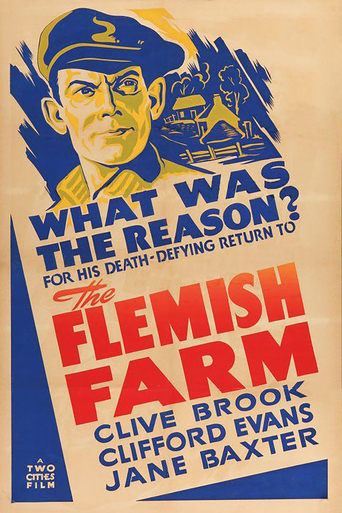Leofwine_draca
THE FLEMISH FARM is a British WW2 propaganda movie made contemporaneously with the war itself. The setting is, as the title would suggest, Belgium, where Allied forces send an airman into occupied territory in order to fight for the honour of the regiment. There's courage amid the chaos, and more than a little romance, and most of all this is a vehicle for actor Clifford Evans to display the depth of his acting talent, which is quite considerable. Evans is one of those faces who seems to pop up in British cinema over a two decade period (he had a notable role in Hammer's KISS OF THE VAMPIRE) and he certainly rewards the viewer with his presence here. The rest is typical, fairly watchable but too low budget to stand out.
malcolmgsw
This is a propaganda film made in 1942,at a time when people needed help to believe in a successful end to the war at a time when not a lot was happening.It has to be said that the best British propaganda films were those that poked fun at the Nazis.Those,like this film,which were deadly serious probably didn't hit the mark because they could not at that time show exactly what was going on as the audiences would have found it too horrific.As has been previously mentioned there is not a great deal of action.It isn't as good as One of our aircraft is missingt or 49th Parallel No doubt this film would have bolstered people's faith in our Belgian allies.
mark.waltz
This is all about the hidden Belgium Air Force flag that patriots long to get out of the country before the invading Nazis find it. The film covers preparation for the invasion (and ultimate take-over), the burial of the flag in a field, its re-discovery and how the freedom fighters manage to get it out of the country. The highlight of the film is the scene where the patriots utilize a dog to smuggle it across a river while one of them deals with a German guard while crossing a aqueduct. There are plenty of conversations concerning why saving the flag is so important, how and why the Belgians are willing to risk their lives to keep it out of the Nazi hands (it is simply a symbol of their independence) which becomes simple war-time entertainment. Filled with predictable reminders that there are many things we were fighting for, it all comes down to one word: freedom.
Robert J. Maxwell
It's early in the war and some of the Belgian Air Force pilots manage to escape in their Hurricanes to England, where they join the RAF, which needs all the pilots it can get.However, they've left their regimental flag behind, buried somewhere on the grounds of a Flemish farm. Clifford Evans is dispatched to retrieve it after the Battle of Britain. Of course, Belgium by this time is occupied by the Germans, all of whom are brutal, humorless, and efficient.Not much action but a good deal of suspense as Evans works his way through the Belgian underground and overground to find the flag and get it back to its proper place in England. People die, willingly, in his aid.There are one or two poignant moments. One is when Evans first learns from his Commanding Officer in Britain that his best friend and colleague, Matagne, has been shot down and killed. Evans' response is wordless. He accepts a cigarette from his CO, stares at it, and it drops from his fingers.Another touching scene has Evans meeting his mother in the park of a Flemish village after his return. The park is under surveillance by the Nazis, and the two can only sit on a bench pretending to ignore one another while speaking under their breaths. The old lady briefly touches his hand before leaving.The acting is competent. There are no bravura scenes. And the direction is better than might be expected in a film made under war-time conditions in Britain. Clive Brook is giving himself up to be shot in order to save some hostages and as he walks to his doom at Gestapo headquarters he's followed by a noisy woman who chatters on about villagers who, she believes, may be Jewish communists. He tries to put her off, having intimations of mortality on his mind, but she persists in noisily following him. The dramatic music swells until we can no longer hear her complaints. It's a simple device, but it required some thoughtfulness on somebody's part.It can be asked whether a flag is worth so much risk, so many deaths. It's a piece of cloth after all and the only value it has is the value we attribute to it. Historically, flags had practical functions. Amid the confusion and smoke of battle, flags provided rallying points for military units. But whatever a flag's current value in real life, in 1943, in the movies, it was a symbol for something else.Rather neatly done.


